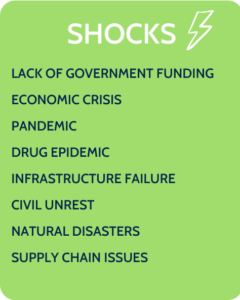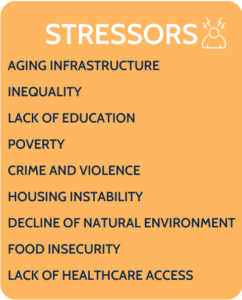Economic Resilience
ECONOMIC RESILIENCE
The economic security of a place and its people is directly connected to the ability to prevent, survive, and recover quickly from major economic and social disruptions. Establishing economic resiliency in a local or regional economy requires communities to identify the “shocks” and “stresses” that are or could potentially be considered a risk, evaluate how those risks may impact the economy and its residents, and build a responsive capacity.
Shocks are time-bound acute events that can significantly impact a region. Stresses are chronic conditions that weaken the fabric of a region over time — whether it’s on a day-to-day or cyclical basis. In 2017 Louisville was selected as a member city in the 100 Resilient Cities Network. Although this project has ended and the last report was given in 2019 before the start of the pandemic, many of the shocks and stressors identified are still relevant. The shocks and stressors identified below were developed in consideration with the most recent Resilient Louisville resiliency strategy and the Louisville-Jefferson County Metro Government Office of Resilience and Community Services Strategic Plan.


The Economic Development Administration (EDA) states that “CEDS provides a critical mechanism to help identify regional vulnerabilities and prevent and/or respond to economic disruptions. Therefore, embracing economic resilience must be a key component of the CEDS document.”
The EDA recommends integrating resilience into the CEDS using a two-pronged approach:
1. Planning for and implementing resilience through specific goals or actions to bolster the long-term economic durability of the region (steady-state).
2. Establishing information networks among the various stakeholders in the region to encourage active and regular communications between the public, private, education, and non-profit sectors to collaborate on existing and potential future challenges (responsive).
- Continue comprehensive planning efforts throughout the region and coordinate the integration of existing hazard mitigation and resilience plans-KIPDA Regional Hazard Mitigation Plan 2021, Louisville Hazard Mitigation Plan, and regional economic resiliency plans.
- Build a resilient workforce that can adapt to economic shifts.
- Diversify the economic base and target industries that build on the region’s strengths and provide quality jobs that will help to close the economic gaps that exist within the region.
- Target socially and economic depressed areas for increased business and resource development including transit, education, and health care.
- Continue to promote underutilized or build-ready commercial and industrial sites through GIS related databases (Think Kentucky, LOJIC, ZoomProspector etc.)
- Employ safe and sustainable development practices that are inclusive and equitable. Strategies may include preventing development in floodplains, preserving natural lands, increasing the tree canopy, integrating green infrastructure, improving air quality and protecting all vulnerable neighborhoods from the impacts of extreme weather.
- Build resilient infrastructure and ensure availability of water, sanitation, and energy.
- Promote resilient transportation planning.
- Increase collaboration between all stakeholders within the region and create a regional community plan that target resiliency efforts on economic, social, and environmental risks.
- Establish a communication network between key local, regional, state, and federal officials to coordinate impact assessments, integrate recovery plans and needs, and identify responsible entities.
- Establish a program to help businesses with preparedness efforts and post-disruption recovery.
- Focus on understanding and addressing citizen vulnerabilities through mitigation and preparedness measures.